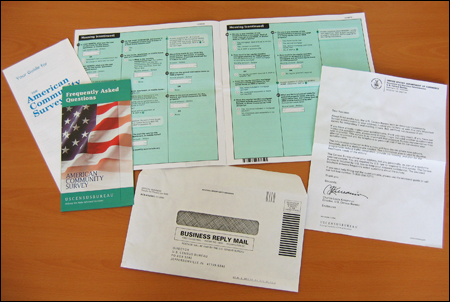As if the drama surrounding the reauthorization weren’t enough, there is another transportation battle brewing between the House and Senate. Last month, the House voted to eliminate funding for the American Community Survey, which is the Census Bureau’s way of getting a yearly pulse-check of how the country is doing and where investment is needed. The Senate’s version of the Commerce, Justice and Science appropriations bill [PDF], approved at the committee level, does not include this ill-advised amendment to defund the survey.

The difference in the bills will have to be resolved in conference or in a year-end agreement on the FY2013 budget. A Senate floor vote has not yet been scheduled to take up the bill.
It is hard to overstate the importance of the American Community Survey. In addition to state- and local-level demographic information such as income, employment and housing, the survey includes data on where Americans work, how we get to work, and how long we take to get there. It’s the primary source of information on rates of bicycle commuting, for example, and advocates and planners carefully analyze its results to determine when more bike infrastructure is needed.
No other survey done by the government – or anyone else – provides such a rich source of information about the economy and American society.
In the unlikely event that the House bill becomes law, transportation planners could be left without a reliable guide for making decisions. The survey results guide the distribution of more than $400 billion, including funds for transportation projects.
The U.S. Department of Transportation, states and local governments use the findings to develop transportation plans and identify the need to fund public transportation, roads and transit options for the elderly and disabled.
Businesses also rely on the data to decide where to establish operations, recruit workers and gain information on consumer behavior. Eliminating funding for the ACS would leave the business community without a reliable data source to make intelligent decisions and avoid wasteful spending.
In introducing the amendment to eliminate funding, Representative Daniel Webster (R-FL) cited constitutional and privacy concerns. He compared the Census Bureau to the Environmental Protection Agency and bank regulators, saying that these agencies intrude on people’s lives.
These comments expose this freshman’s lack of understanding of what the American Community Survey is and does.
It’s an annual, more detailed version of the decennial census, replacing the old “long form” survey. As for the allegation that it’s unconstitutional: Article 1, Section 2 of the U.S. Constitution says that the census will be conducted “in a manner as Congress shall by law direct.”
“They don't seem to recognize that a number of the questions on the ACS have been asked since 1850,” said Andrew Reamer, Research Professor at George Washington University’s Institute of Public Policy. “James Madison and Thomas Jefferson and a series of presidents since then were strongly in favor of using the census to collect data for public policy purposes.”
Senator Rand Paul (R-KY) has proposed a bill that would make participation in the ACS voluntary, which would have the effect of making the data highly unreliable. Webster used the term “random” pejoratively when describing the ACS – not understanding, apparently, that its randomness is what makes it scientific.
Under current law, completion of the survey is mandatory and, in theory, households that refuse to complete it could be subject to a $5,000 penalty. But the Census Bureau has no enforcement powers and no one has ever been fined. However, because completion of the survey is legally required, compliance rates are extraordinarily high, making the results highly reliable.
During debate on the Webster amendment, much was made of the sensitive nature of some of the questions. But this objection is meaningless because the survey protects the confidentially of the information and the identity of the respondents. Besides, Congress could simply direct the Census Bureau to revamp the questionnaire to make it less intrusive rather than get rid of the entire program.
Beyond the zealousness that the House action showcases is a broader trend on the Hill to govern based on anecdotes rather than data.
In an interview with Science Magazine, Robert Groves, the outgoing director of the Census, decried the “gigantic mismatch” between the wealth of data about the state of our economy and society, and the interest by policy makers in using that data as part of their decision making process.
"I’ve devoted my life to trying to improve the quality of statistical information, and it is disappointing to see how little of that is used to make decisions," he said.
The silver lining of the House’s misguided decision to kill the ACS is that it’s unlikely to be replicated in the Senate. The two-year Senate transportation bill (MAP-21), passed in March of this year, explicitly calls for an “outcomes-driven approach” by states and localities to track the performance of transportation programs. The American Community Survey gives transportation officials the necessary tools to pursue this approach.
Both House and Senate transportation proposals mandate the increased use of formulas to distribute highway funds with the aim of improving surface transportation and the movement of goods on the nation’s highways. Those funding formulas are derived from ACS data.
If a focus on smart decision-making doesn’t save the American Community Survey, maybe pressure from the business community will. Negative reaction to the legislation has come from pro-business publications like the Wall Street Journal and Bloomberg-Business Week.
The American Community Survey is critical to good decision-making in transportation and many other areas of our lives and our communities. All eyes are on the Senate, where, hopefully, cooler heads will prevail.





